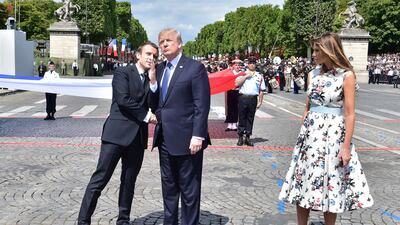With a military parade on the Champs-Elysees and a gilded tour of France's most historic monuments, French president Emmanuel Macron laid on the charm as he positioned himself as the indispensable intermediary between Europe and Donald Trump.
The Bastille Day demonstration on Friday capped two days of Parisian glitz for Mr Trump and his wife, who were President Macron's guests of honour in commemoration of the 100th anniversary of America's entry into World War I.
Thanking the United States for the decision that turned the tide of a devastating conflict,Mr Macron said the Trumps' presence on France's national holiday "is the sign of a friendship across the ages."
Mr Macron made a point of detailing both the long history of ties between France and America and the areas where he and Trump disagree. But he made it clear it was in the spirit of bluntness with a friend and ally, even offering a conspiratorial wink during a joint news conference.
The two-day visit which began on Thursday featured a personal tour of the golden-domed Invalides monument (site of Napoleon's tomb) and a private dinner high in the Eiffel Tower prepared by master chef Alain Ducasse himself.
Mr Trump had front-row seats on Friday for the two hour-long parade which took place under blue skies, and applauded enthusiastically as various French military units marched past. At one point, Mr Trump saluted a combined group of US army and navy troops and Marines taking part in the annual event.
The two presidents both came to power as unlikely outsider candidates. The youngest president of modern France — and the same age as Donald Trump Jr. — Mr Macron started his own political movement just over a year ago. He has since won a strong parliamentary majority and is riding high in the polls.
The flattery from his French hosts was a respite for Mr Trump from his troubles at home, and he amended the opinion of a friend he calls Jim, who believes that "Paris isn't Paris any longer" because of the blight of Islamic extremism.
Asked about Jim's criticism, Mr Trump replied, Paris was "going to be just fine" because France now has a "great" and "tough" president. At their first encounter in May, the two men shared a white-knuckle handshake that the French president said was intended to show he was no pushover.
As Friday's visit ended, the men embraced and then the arm wrestling seemed to begin anew. As Mr Trump walked to his motorcade, he gripped Mr Macron's hand firmly, pulling the smaller man off-balance, and held fast as they walked together toward their wives.
Still, both seemed to minimize their differences, said Spencer Boyer, former national intelligence officer for Europe and a senior fellow at the Brookings Institution.
"President Macron was highly skilled at putting President Trump at ease and avoiding any land mines that would have derailed the show of unity," Mr Boyer said. "Macron was especially adept at sidestepping questions about US political controversies, which Trump clearly appreciated."
Although the welcome may have taken some of the sting out of their first encounter, Mr Macron's amiable meeting with German Chancellor Angela Merkel earlier in the day showed the balance the French leader appears to be striking.
With Ms Merkel, he emphasized their agreement on nearly every issue as well as their joint development of a fighter jet.
The German leader said there was no getting around interdependence in the 21st century. "Europe alone cannot win the war on terrorism," she said.
"There is no divergence between France and Germany in the manner of treating President Trump," Mr Macron added.
Still, the German chancellor, who was less than a block from the US Embassy when Mr Trump was ensconced inside, left the presidential palace before she and the American president could cross paths.
Mr Trump left open the possibility of reconsidering his decision to pull the US out of the Paris climate accord — the main source of disagreement with European Union governments. But he said if it doesn't happen, "that will be OK too."
Mr Macron's ability to firmly acknowledge his differences with Mr Trump are part of modern French tradition. His invitation to Trump was "a way of illustrating the history of France and America, allied but not aligned," said Thomas Gomart, director of the French Institute for International Relations.
Mr Trump's parting tweet showed a photo of the two men looking out over the Champs-Elysees, standing shoulder to shoulder during what the American described as a "magnificent #BastilleDay parade."

